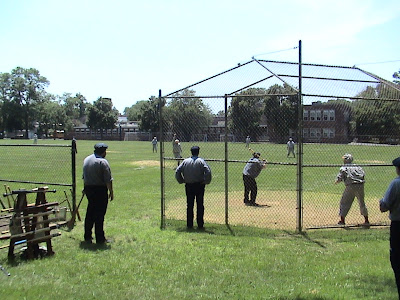Just before Saturday's first game, a member of the Diamond State Club of Delaware asked a few of us where the Neshanock's home field is. The short answer is that we don't have one - instead of hoping crowds will follow the Neshanock, the Neshanock follow the crowds. It's a good strategy, the one time in my 2 1/2 years we played in Flemington, not only weren't there any spectators, hardly any family members showed up! So this past Saturday's games with the Diamond State Club were played in Princeton, an annual event for the Princeton Historical Society.
The Diamond State Club is relatively new, this being their third season, but they have quickly moved up the ranks and are formidable opponents as the Neshanock learned a year ago. Saturday, however was the Neshanock's day as the "local" club won both games 7-6 and 19-12, the latter in one extra inning. In the first match Flemington took an early 4-1 lead and held on for the win. Both "Jersey" Jim Nunn and Jack "Doc" Kitson earned clear scores in the match and it was established that at least for this year, a batter must make at least two plate appearances to qualify for a clear score (Neshanock rule - no historical basis).
The first match was played by 1864 rules and after a quick break the second match got underway this time using 1873 regulations.
Although the Neshanock again took an early lead, the Delaware Club battled back and took a 10-7 lead into the top of the seventh (two seven inning games because of the heat). A three run Neshanock rally tied the contest, but things looked bleak in the bottom of the inning when Diamond State loaded the bases with only one out. But a 9-16-4 (5-2-3 under modern scoring) double play erased the threat and sent the game into extra innings where the Neshanock broke the game open with nine runs.
Photo by Mark Granieri
Clear scores abounded with Bob "Melky" Ritter and Ken "Tumbles" Mandel earning their first clear scores of the season and Dan "Sledge" Hammer and Tom "Thumbs" Hoepfner each recording their second. "Thumbs" arrived late and in a Frank Merriwell like appearance made major contributions on both offense and defense. In his own unique style "Tumbles" made his clear score by reaching base all three times on muffs by the other team - in addition to providing comic relief, it showed one of the fallacies in the concept.
Like Hoboken, Princeton has its own place in early New Jersey base ball history since the Nassau Club of Princeton was most likely New Jersey's first college team. One of the prime movers in founding the club was a young man named Lewis W. Mudge. I first encountered Mudge when researching the opening of Ebbets Field in Brooklyn. Just prior to the April 1913 debut of that historic park, Mudge wrote to the Brooklyn Daily Eagle to describe how he and two other young Brooklynites enrolled in the Class of 1862 at the College of New Jersey (today's Princeton University) and brought with them their bats, balls and above all their enthusiasm for base ball. They founded the Nassau Club and Mudge came to be known as the Father of Base Ball at Princeton.
Photo by Mark Granieri
Mudge also figured in another part of the development of base ball in New Jersey. Prior to his arrival at Princeton, Mudge spent some time at a prep school in Bloomfield, New Jersey which was then the much larger Bloomfield Township. During that period he played in at least one game for the Union Club of Bloomfield. There was a fair amount of base ball activity in Bloomfield before the Civil War and it appears that at least some of it was due to the existence of a number of schools like the prep school Mudge attended.
After graduating from Princeton in 1862, Mudge and a number of his teammates went on to Princeton Seminary to prepare for the Presbyterian ministry. While in Seminary, he continued to play for the Nassau Club (eligibility rules were obviously more flexible in those days). Mudge later spent 20 years as the Pastor of the 2nd Presbyterian Church of Princeton, but resigned in 1895 in order to facilitate the merger of two Presbyterian churches. It was after all the "manly" thing to do



No comments:
Post a Comment